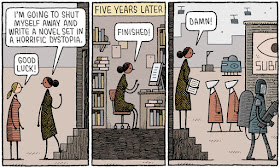Merlin at War takes place after the fall of France; the armistice between Vichy France and Germany is in effect, and the nominal government of France collaborates with Nazi Germany in reprehensible ways.
The book begins, however, in Crete where a team of British soldiers hope to escape and be evacuated. Only one man survives the perilous journey. The survivor carries a letter from his superior officer, but the officer dies before he can definitively designate the letter's recipient.
Ellis depicts a London during the nervous calm after the autumn Blitz of 1940: a young woman dies in a botched abortion; the French emigre doctor who performed the abortion is murdered; a traitor among the Free French delegation operating from London sends messages to the Vichy government with the time and place a young agent is to be dropped into France; there are a connections to Buenos Aires and New York.
Ellis depicts a London during the nervous calm after the autumn Blitz of 1940: a young woman dies in a botched abortion; the French emigre doctor who performed the abortion is murdered; a traitor among the Free French delegation operating from London sends messages to the Vichy government with the time and place a young agent is to be dropped into France; there are a connections to Buenos Aires and New York.
Most of the book is a satisfying mystery with compelling historical elements, but the multiple subplots slow it down a bit. Nevertheless, Merlin at War presents a view of the war from many angles, and Ellis' main characters have depth and dimension.
Read in August; blog review scheduled for Sept. 27.
NetGalley/JKS Communications
Historical Mystery/WWII. Oct. 12, 2017. Print length: 490 pages.
















